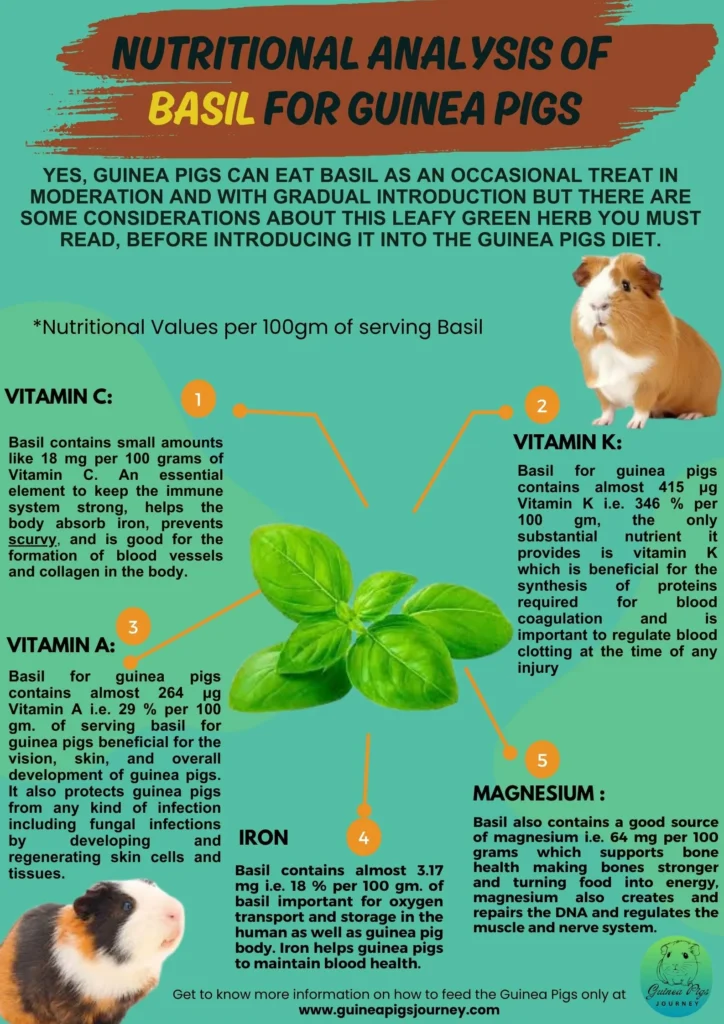Basil! It is a leafy green like cilantro, rosemary, mustard greens, arugula, or parsley, but a culinary herb and a member of the Lamiaceae (mint) family. Basil comes in many varieties popular as a food seasoning and is loved by many people to add unique flavor to their sauces, salads, and soups. But you must be wondering a question in mind can guinea pigs eat basil?
The simple answer is yes, guinea pigs can eat basil in moderation as it is high in calcium contributing to bladder stones which makes it limited to be served as a treat. Basil also contains Vitamin C as most other herbs, especially when you compare it to parsley which has seven times as much than basil.
This long guinea pig journey led me to research this leafy green herb to ensure safety and fulfill the optimum nutritional requirements of my furry friends. After understanding and introducing basil into my guinea pig’s diet, I decided to share this experience and valuable knowledge with my fellow guinea parents to guide them on basil for guinea pigs.
It is very crucial to understand its nutritional analysis with benefits, risks, and other factors like how good the basil is for these little furry friends. How often can guinea pigs eat basil? Which part of basil is safe to feed guinea pigs? And many others before introducing it into the guinea pigs’ diet. Let’s quickly go through all these factors related to basil for guinea pigs.
Is Basil Safe To Feed Guinea Pigs?
Yes, Basil low in calories, sugar, and carbohydrates is safe for our guinea pigs to feed in moderation. It is not recommended to feed basil oil to your guinea pigs it would be dangerous for guinea pigs’ overall health. This leafy green herb basil for guinea pigs contributes vitamins and minerals and also supplies beneficial plant compounds that have antioxidant, anti-inflammatory, and other health properties. Basil is also a good source of vitamin C, calcium, magnesium, potassium, and iron. Basil is used for stomach spasms, loss of appetite, intestinal gas, kidney conditions, and warts. It is also used to treat snake and insect bites.

Alongside many health benefits, there are some risk factors associated with the excessive feeding of basil to guinea pigs. Basil contains a chemical, estragole, which has caused liver cancer in laboratory mice. Basil oils and extracts might slow blood clotting and increase bleeding. Basil in excessive amounts may lower blood pressure. It is always recommended to feed any new food including basil in moderation to limit the frequency and size of serving basil for guinea pigs to achieve potential health benefits and avoid any kind of risk factor for guinea pigs.
Nutritional Requirements of Guinea Pigs:
Guinea pigs being herbivores creatures need a plant-based diet to achieve their nutritional requirements and their owners must know “The recommended and best diet for their guinea pigs”. Guinea pigs require good quality hay which makes the 80-90 % of most of their diet along with 10 % of fresh and good quality fruits and vegetables such as sugar snap peas, broccoli, Swiss chard, asparagus, arugula, dandelions, rosemary, pears, honeydew melon, cherries, plums, etc. as a treat in moderation.
Guinea pigs can also be served with some amount of only dedicated guinea pig pallets but it should not be part of their main staple and should be served the recommended portion or mentioned on pallets bag for guinea pigs. Guinea pigs should also be served with fresh, clean, chlorine-free drinking water at all times and must be checked and changed twice a day for their good health.
However, not all foods your guinea pigs eat are safe, such as pickles, cheerios, olives, jalapenos meat, etc.; some are toxic and harmful to their health and digestive system. So, you must also know about those foods not recommended to feed guinea pigs for their safe and healthy life. The list of safe food that can be fed to guinea pigs is so long that needs great care to know the best way of feeding guinea pigs.
Basil for guinea pigs can be a nutritious addition if served in moderation as well as a gradual introduction. It is also very important to first know the nutritional analysis of basil so that an owner can decide on the quantity and portion of serving to ensure moderation.
Nutritional Analysis of Basil for Guinea Pigs:
Basil is fully packed with important nutrients, vitamins, and minerals like Calcium, Iron, Magnesium, Vitamin C, A, and K as well as antioxidants that will boost your guinea pigs’ overall health if fed in moderation, whereas excess amount can be harmful and risky for guinea pigs health. So, it is very important to understand the values and percentage of these important nutrients basil contains for guinea pigs and how much is required for your lovely pets. According to the USDA food database, listed below are the nutritional values and percentage per 100 grams of basil for guinea pigs.
| Nutrients | Value per 100 grams | Daily Value (DV %) |
| Calories | 23 kcal | |
| Carbohydrates | 2.65 grams | 1 % |
| Water | 92.1 grams | |
| Fat | 0.64 gram | 1 % |
| Protein | 3.15 grams | 6 % |
| Dietary Fiber | 1.6 grams | 6 % |
| Sugar | 0.30 grams | |
| Net Carbs | 1.05 grams | |
| Vitamin C, total ascorbic acid | 18 mg | 20 % |
| Vitamin A, RAE | 264 µg | 29 % |
| Vitamin K | 415 µg | 346 % |
| Vitamin B6 | 0.155 mg | 9 % |
| Vitamin D | 0 mcg | 0 % |
| Cholesterol | 0.00 mg | 0 % |
| Fatty Acid | 0.041 g | 0 % |
| Calcium, Ca | 177 mg | 14 % |
| Phosphorus, P | 56 mg | 4 % |
| Potassium, K | 295 mg | 6 % |
| Iron, Fe | 3.17 mg | 18 % |
| Magnesium, Mg | 64 mg | 15 % |
| Zinc, Zn | 0.81 mg | 7 % |
| Sodium, Na | 4 mg | 0 % |
| Copper, Cu | 0.385 mg | 43 % |
| Folate | 68 µg | 17 % |
Note: * The % Daily Value (DV) indicates how much a nutrient in a serving of food subsidizes a daily diet.

What Are The Nutritional Benefits Of Basil For Guinea Pigs?
Keeping in mind the moderation process can get potential nutrients out of any food including basil for guinea pigs. Let’s know what type of nutrients basil contains for guinea pigs.
How much Vitamin K is in basil for guinea pigs?
Basil for guinea pigs contains almost 415 µg Vitamin K i.e. 346 % per 100 gm. of serving basil guinea pigs and the only substantial nutrient it provides is vitamin K which is beneficial for the synthesis of proteins required for blood coagulation and is important to regulate blood clotting at the time of any injury. Consuming Vitamin K properly may heal those injuries as early as possible. Vitamin K also supports heart health by preventing the hardening of arteries including calcium out of the artery linings.
How much Vitamin A is in basil for guinea pigs?
Basil for guinea pigs contains almost 264 µg Vitamin A i.e. 29 % per 100 gm. of serving basil for guinea pigs beneficial for the vision, skin, and overall development of guinea pigs. It also protects guinea pigs from any kind of infection including fungal infections by developing and regenerating skin cells and tissues. Vitamin A for guinea pigs also helps to protect against the free radicals which can cause many diseases including cancer in guinea pigs.
Vitamin A helps guinea pigs with the development and growth of cells and the overall body would help them in working of heart, lungs, and other organs properly. Vitamin A also boosts the immune system of guinea pigs.
How much Iron is in basil for guinea pigs?
Basil contains almost 3.17 mg i.e. 18 % per 100 gm. of basil important for oxygen transport and storage in the human as well as the guinea pig body. Iron is a part of hemoglobin protein which is contained in red blood cells responsible for oxygen transport and carbon dioxide removal in organs and tissues of guinea pigs. Iron helps guinea pigs to maintain blood health.
How much Magnesium is in basil for guinea pigs?
Basil also contains a good source of magnesium i.e. 64 mg per 100 grams which supports bone health making bones stronger and turning food into energy, magnesium also creates and repairs the DNA and regulates the muscle and nerve system. Magnesium plays an important role in nerve, immune, and muscle function. It is a part of enzymes that create DNA, RNA, and ATP.
How much Vitamin C is in basil for guinea pigs?
Basil for guinea pigs contains almost 18 mg of vitamin C i.e. 20 % per 100 gm. of basil which prevents a dangerous disease called scurvy in guinea pigs which can even lead to malnutrition and sometimes can also cause death. Vitamin C also helps guinea pigs build a strong and secure immune system that can fight against many viruses and bacteria to keep guinea pigs safe and healthy.
Does Basil contain Antioxidants for guinea pigs?
Basil is a good antioxidants that help support the immune health of guinea pigs as well as prevents or slows down the signs of aging. Important to note that basil contains only 0.3 grams of sugar per 100 grams of basil which is good news but moderation is the key to serving.
What Are The Risks Of Basil For Guinea Pigs?

Urinary Tract Issues:
Basil is a high source of calcium containing almost 177 mg i.e. 14 % per 100 grams of serving basil for guinea pigs. Unfortunately, calcium in excess can cause urinary tract issues including urinary tract infections that can lead to the formation of bladder and kidney stones in guinea pigs if moderation is not ensured while feeding basil to guinea pigs. Urinary tract issues for guinea pigs are so painful that they cannot pee properly and even in some cases they stop peeing if the urethra is blocked by stones.
Gastric Upset:
Guinea pigs can go through gastric upset due to excessive feeding of basil which can cause diarrhea, vomiting, stomach upset, and bloating that can ultimately affect the overall health of your guinea pigs.
Dehydration:
Although, basil is a good source of water content i.e. almost 92.1 grams per 100 grams serving basil for guinea pigs excessive feeding of basil can be a diuretic which can lead to loss of fluid loss and your guinea pigs can be dehydrated due to such conditions. So, it is recommended that ensure moderation while feeding your guinea pigs.
Allergic Reactions:
One important concern for guinea parents is also observing and monitoring their guinea pigs’ reactions or any kind of allergic signs while offering any new food including basil. It depends on Individual guinea pigs, some may be allergic to basil and some may adjust it very easily. It is very important for guinea parents to consult a vet before introducing basil into guinea pigs’ diet and always monitor the reaction or any change in guinea pig’s behavior if you introduce any new food to the guinea diet, then immediately contact your veterinarian for further guidance.
How Often Can Guinea Pigs Eat Basil? (Frequency and Size of Serving Basil)

If you want to ensure moderation in guinea pigs’ diet then this part of the question is very crucial to understand and apply for your guinea pigs’ nutritional requirements and safety. Let’s understand the Frequency and size/portion of serving basil for guinea pigs.
The recommended frequency and portion of serving basil is about 1-2 leaves of basil in moderation, per guinea pig, and no more than 1-2 times a week while considering other fruits and veggies in their diet as an occasional treat.
You can also mix basil with other fresh leafy greens and veggies like arugula, asparagus, cilantro, mustard greens, green beans, snap peas, butternut squash, etc. to make it a good treat for your lovely pet while considering the amount and portion of serving by ensuring moderation as a rule of thumb.

Can Guinea Pigs Eat Basil Every Day?
No, it is not generally recommended to feed basil to guinea pigs every day because basil is rich in calcium and water which can affect the overall health of guinea pigs causing bladder or kidney stones, urinary tract issues, digestive issues, as well as can be diuretic which can lead to loss of fluid loss and your guinea pigs can be dehydrated due to such condition.

It is always recommended to ensure moderation in guinea pig’s diet and serve them the recommended frequency and size of serving as explained above.
How to Prepare Basil for Guinea Pigs?
- Purchase/choose a good quality and fresh, green, healthy, and most importantly organically produced leaves of basil for guinea pigs from a verified dealer or store. Ensure that basil leaves are not overly wilted and spoiled.
- Thoroughly wash the basil leaves in cold running water to remove any dust particles, chemicals, pesticides, or traces of germs, and let them dry after washing before serving.
- Chop basil into small pieces as a treat, however guinea pigs can eat the stems/stalks without chopping or cutting.
- It is very important after preparing basil, introduce it in appropriate quantity to ensure moderation and if it is their first time then introduce a small portion i.e. one leaf for each guinea pig, and observe their reaction to adopting this new diet.
- You can also serve them like ½ amount in the morning and the other half in the evening to ensure moderation and gradual introduction.
- You may also give basil by mixing it with other veggies to your guinea pigs as a healthy and nutritious treat.
- In the end, the most important task to do is that when your guinea pigs are done eating basil, be sure to check and remove the uneaten basil from the cage or their surroundings to avoid the multiplication of bacteria and inviting flies that can be harmful to guinea pigs.
Can Guinea Pigs Eat Basil All Parts?
Although, guinea pigs love to eat this leafy green basil in moderation. An important question comes to mind while offering this herb to guinea pigs can guinea pigs eat all parts of basil? Let’s have a look at basil and its parts safe to eat or not.

Can Guinea Pigs Eat Basil Leaves?
Yes, guinea pigs can eat the basil leaves in moderation and with the gradual introduction as a key to feeding. Basil leaves contain important plant compounds that have antioxidant, anti-inflammatory, and other health properties.
Can Guinea Pigs Eat Basil Stems/Stalks?
Yes, guinea pigs can eat the stems/stalks of basil in moderation which would add additional nutritional benefits as it also contains more fiber than basil leaves, important antioxidants, and other nutrients beneficial for your guinea pigs.

Ensure that basil stems or basil stalks are not over wilted, always provide your guinea pigs with fresh and organically basil leaves and stalks or stems which would be much nutritious for them.
Can Guinea Pigs Eat Basil Flowers?
Can Guinea Pigs Eat Basil Roots?
No, guinea pigs should not eat basil roots. The roots of basil, like many other plant roots, are not suitable for guinea pig consumption. They may contain compounds that could be harmful to guinea pigs or cause digestive issues. It is recommended that stick to the leaves and stalks parts of basil which are safe to feed guinea pigs.
Can Guinea Pigs Eat Basil Seeds?
Yes, guinea pigs can eat basil seeds in powder form because solid basil seeds can cause choking hazards as well can stick to the teeth of guinea pigs. So, you can sprinkle the basil seed powder in the guinea pig’s diet as an occasional treat and variety for guinea pigs in moderation.
Basil’s seed powder contains numerous health benefits contains high levels of fiber and is safe to feed guinea pigs in moderation but eating excessively can cause bloating, abdominal cramps, and diarrhea. A study also suggested that some potential antibiotic properties are also present in basil seeds and used as an effective treatment for rats with diabetes, lowering both body weight and blood sugar level. That means rodents can eat basil seeds but check out for choking hazards and to avoid that we can serve them powder of basil seeds in their diet.
Can Guinea Pigs Eat Cooked or Processed Basil?
No, do not feed your guinea pigs cooked or processed basil because it contains seasonings, salts, oil, etc. which can be harmful to guinea pigs’ digestive system causing stomach upset, bloating, vomiting, etc. It is recommended to serve fresh, raw, and organically produced basil for guinea pigs.
Can Guinea Pigs Eat Frozen Basil?
No, do not feed frozen basils directly from the freezer, make them cool down at room temperature before serving your guinea pigs. Frozen basils can cause stomach upset which can affect their overall health. Serving frozen basils is not the ideal form of basil to offer them. Freezing basil can cause changes in texture and flavor, and guinea pigs may not find it as appealing as fresh basil. Additionally, freezing can lead to the breakdown of some nutrients over time.
Can Guinea Pigs Eat Dried Basil?
No, it is not recommended to offer dried basil to guinea pigs. After all, the dried basil may pose some risk because dried basil sometimes harbors molds or fungi causing serious health issues for guinea pigs if ingested. Dried basil tends to be more concentrated, though with somewhat diminished nutritional content as compared to fresh basil for guinea pigs. So, it is always recommended to offer fresh and raw basil for guinea pigs.
What Types Of Basil Can Guinea Pigs Eat?
Today, Ocimum basilicum (the scientific name for basil) grows in many places around the world. Many people even grow basil very easily in their kitchens, balconies, or gardens. There are more than 60 varieties of basil, with sweet basil being one of the most widely used. Different varieties of basil offer slightly different flavors. Let’s have a look at some commonly used basil by humans and find out which type is safe to feed guinea pigs.
Can Guinea Pigs Eat Sweet Basil?

Yes, Guinea pigs can eat sweet basil in moderation which is most commonly used as mentioned above, sweet basil is one of the most widely used with bright green leaves and have a strong smell, and a recognizable flavor that can grow up to 12-18 inches tall.
Can Guinea Pigs Eat Holy Basil?
Holy basil, also known as Ocimum sanctum or Tulsi, is a variety of basil an herb originally grown in the tropical climates of India and nearby countries that holds significant cultural and medicinal value in various parts of the world. It’s revered for its aromatic fragrance and purported health benefits, including its potential to boost immunity and alleviate stress.

Although Guinea pigs can eat holy basil, it is crucial to exercise caution when introducing holy basil into a guinea pig’s diet. While basil, in general, is considered safe for guinea pigs when offered in moderation, holy basil may have different properties or effects that could impact their health. Assess the nutritional content of holy basil to determine its suitability for guinea pigs. Like other varieties of basil, holy basil contains essential nutrients such as vitamins A and K, as well as antioxidants, which can contribute to overall health.
Can Guinea Pigs Eat Greek Basil?

Yes, guinea pigs can eat Greek basil in moderation which is the most commonly known type of basil and grown around Greece but you must exercise caution while offering Greek basil in a guinea pig’s diet because just like all the basils it is very crucial to understand and know the nutritional facts and fingers about Greek Basil before introducing it into guinea pigs diet.
Can Guinea Pigs Eat Green Ruffles Basil?

Yes, Guinea pigs can eat Green Ruffles basil in moderation, it has a milder flavor which is enjoyed by guinea pigs. Green Ruffle basil is a type of annual herb with green curled leaves that can grow up to 24 inches tall with quite large leaves.
Can Guinea Pigs Eat Lemon Basil?

Yes, guinea pigs can eat lemon basil in moderation but you must exercise caution while feeding lemon basil and it should not be served too often due to its high calcium content. Lemon basil also contains some good nutrients for guinea pigs and is an excellent source of vitamin K, vitamin C, beta carotene, and important minerals such as iron, magnesium, copper, etc.
Can Guinea Pigs Eat Thai Basil?

Yes, Guinea pigs can eat Thai basil in moderation and with gradual introduction as well as the limited quantity of this type of basil because it has a high level of calcium which in excess can cause urinary issues for guinea pigs. Thai basil is a good source of vitamins C, K, and A, as well as beta-carotene, magnesium, iron, and potassium.
Alternatives of Basil for Guinea Pigs:
Although guinea pigs enjoy basil in their diet still some individual guinea pigs may like or dislike the basil in their diet, so there must be an alternative to this herb in their diet to fulfill nutritional requirements. Listed below are some herbs as an alternative to basil for guinea pigs.

Cilantro: Cilantro is perfectly safe to feed guinea pigs in moderation, and with gradual introduction guinea pigs love and enjoy its fragrance and citrusy flavor, being one of the best sources of Vitamin C and other beneficial nutrients for guinea pigs.
Oregano: Guinea pigs can also eat oregano as it also provides nutritional benefits for them.
Fennel: This is also a powerhouse of nutrients for guinea pigs if fed in moderation.
Rosemary: Guinea pigs love to eat rosemary, a good source of vitamin C, antioxidants, and minerals, and can provide good health benefits if fed in moderation.
Dill: Yes guinea pigs can also eat the dill as an herb and love to enjoy it, dill provides Potassium, Magnesium, and other vitamins for guinea pigs.
Parsley: Guinea pigs can eat parsley in moderation which is highly nutritious and offers numerous health benefits for guinea pigs. Always feed parsley in moderation because it is rich in oxalic acid which can cause bladder or kidney stones if fed in moderation.
Mint: It is also a healthy addition to the guinea pig’s diet in moderation but it is highly rich in calcium so always feed in a small quantity to avoid any risk for guinea pigs.
Thyme: Guinea pigs can also eat thyme in moderation and it will provide them with good vitamin C and calcium which will boost the immune system of guinea pigs.







